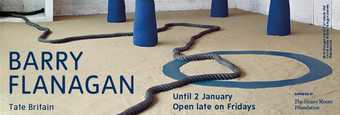Even today the dizzying smell of resin takes me straight back to the 1960s and my earliest memories. The smell of resin and hessian with a back note of poodle poo, pungent little messages that the landlady’s dog left in the yard of a studio my dad used.
The first thing I remember making with dad was a piece called Zebra Horse, which was eventually exhibited with the title Zebra Toy (1966). We used a worn-out striped Breton top of my mum’s, and stuffed it with a folded and bundled fishing net for its body and slotted it between the upturned legs of a little wooden stool. I loved this zebra: it was just the right size to sit on and ride. It was so exciting delivering it to the Institute of Contemporary Arts in London in 1969, where it was going on a tour to the Royal National Eisteddfod of Wales for the exhibition Play Orbit.
I was always happiest with dad in the environment of the studio. On days when I had skipped off school I would go into his studio that occupied the whole of the second floor of our house in Cliff Road, Camden Town, north London, and ask: “What can I do for you, daddy?” He’d set me tasks such as sweeping the sand from the hardboard-covered floors, or arranging tools on his workbench and shelves that he’d built and covered in coloured hessian, held neatly in place with staples.
Dad made a lot of etchings, particularly portraits of artist friends who visited his studio and enjoyed mum’s cooking at the kitchen table. He gave me and Tara, my younger sister, prepared etching plates to work on. Tara made an etching of her Indian toy elephant, Bungo. Dad made a portrait of me making one of him at the same time. It was immensely satisfying to see these treacly black plates of copper become lovely linear black ink on thick white paper. As I got older he would entrust to me more complex tasks, mixing up colours to roll out on to linocuts.
Along with the hessian-covered shelves and workbench, he made our family kitchen table. It survived several moves, though it became clear that it was too big for our house in Leighton Road, Kentish Town. The china on the dresser would wobble precariously as you squeezed between it and one side of the table, and at the other side you’d singe the back of your legs as you shimmied past the open fire in the grate. In the middle of supper one night dad stalked off, returning with a large saw. With great force and vigour, he set to sawing off a plank at each side of the table. As sawdust and a few ripe words flew about, we lifted up our plates of food so he could pass by through the table with the saw. Many corners, particularly those on wooden box plinths used for displaying sculptures, met with dad armed with a saw while hanging his work for a show.
Many years later his love of hessian would be transformed into the dark green carpet that he liked so much. He even had his studio house in Ibiza wall-to-walled, a woollen sea of green that in some places crept up the walls to the dado rail. I asked him once if he wasn’t a sculptor, what would he do? He said: “sell carpet or Concorde.” He always considered himself to be “in trade”, and could only sell something that he loved.
While modelling clay on an armature, whether for a thin horse or a large hare, working in great sweeping motions, he spoke in a kind of shorthand, by gestures or a jut-out of his chin, a snort, a drawing in the air to describe what he wanted doing on a piece of his in readiness for the foundry and bronze. I always knew exactly what he meant. Whether it was just that sculpturally we spoke the same language in profile and proportions, translating ideas into form, or from years of being around him while he worked… a bit of both.
One of the times I was most proud of my dad was a performance, so different from working behind closed studio doors. Hugh Cornwell of the Stranglers wrote a piece of music for the beautiful haunting poem Mantra of the Awoken Powers by Sex W. Johnston. Dad recited the poem over the phone and it was recorded for the ‘We Love You’ project of collaborations between artists and musicians. During Hugh’s gig in Dublin, dad went up on stage in front of the packed house. He held the whole audience, softly spoken and still, wearing a tweed suit and a thick scarf though it was sweltering. At the end everyone went wild, cheering and clapping. Guys at the front were offering up their pints for him in appreciation. Someone next to me said: “That was great, who is that?”
“That’s my dad.”

